Emil Voigt Olympic 5 Mile Champ 1908
This piece continues with our recent theme of "folks you never heard of". Emil Robert Voigt, was and is the Olympic record holder for the five miles. What? English distances in the Olympics. Okay, 1908. He set that record at 25 minutes 11 seconds, and the event was discontinued. I found The Guardian article below, because the newspaper is celebrating its 200th anniversay and it is reminiscing about its historic past. They mention in an article today that even a former olympian had written for them, so I looked up who they were talking about and found the stories below. Voigt, another Brit with a German connection like Harry Edward, was a man ahead of his time. He was a proponent of vegetarianism, massage, and clean living. He was also a pioneer in the field of radio as you will read below. All in all a very interesting character long forgotten.
Strange that Emil attributed much of his success to being a non-smoker. Was that not a given in 1908? Also interesting that a person who was supporting the workers and underdogs was branded a Marxist. Then, like now, there appears to be no middle ground. Bill Schnier
George, Steve, Roy, Jeff, Paul This is fascinating stuff!! Thank you Jay Birmingham
This first piece is from the Olympics website www.olympic.com
Emil Robert VOIGT
Born in Ardwick, Lancashire, England of German parentage, Emil Voigt retained for Great Britain the Olympic 5 miles title that Henry Hawtrey had won in 1906. Voigt was educated at Ross Place School, and later joined the Slade Harriers and the Manchester AC. By virtue of his win in the AAA 4 miles ten days earlier, Voigt was one of the favorites for the 1908 Olympic title, his main opposition came from John Svanberg of Sweden, the world record holder at 5,000 metres, and Charles Hefferon, the versatile holder of the South African mile record, who was to finish second in the marathon later in the Games. Voigt soon disposed of this foreign challenge and won the Olympic title with 70 yards to spare over fellow Mancunian Eddie Owen. Voigt later claimed that his victory was mainly due to his being a vegetarian, teetotaler, and non-smoker. Emil Voigt retained his AAA 4 mile title in 1909, and after winning the mile in 1910 he subsequently retired from competition.
A master engineer who spoke five languages, Voigt sailed for Australia in 1911, where he became one of the pioneers of radio, setting up his own broadcasting station specializing in wrestling commentaries, and he served for 12 years as President of the Australian Federation of Broadcasting Stations. He began to compete again, however briefly, and won the Victorian Championships in the mile in 1912. He started the "Olympic Self-Massage Course" and published a book, Self-Massage\: The Way to Greater Health, Virility, and Happiness. While in Australia, Voigt also started Voigt & King, mechanical engineers, at Armadale. He moved back to England and during World War I ran a welding and brazing works in Manchester. Returning to Australia in 1921, he was active in politics and the development of radio and radio stations down under. He served as director and president of several radio stations and several associations of stations. In his bio in the Australian Dictionary of Biography, historian Chris Cunneen notes that Voigt was, "A restless, contradictory idealist, he had served Australia's early wireless industry and fought in the cockpit of 1920s Sydney Labor politics." His granddaughter commented of his political career, which was investigated by the Australian authorities, "He was thought to be a Marxist, but this was never proven. He did a lot to improve working conditions and help the underdog." In 1948 Voigt moved to New Zealand, where he continued with his various business interests until his death at the age of 90.
Personal Bests\: Mile – 4:19.8 (1910); 3 miles – 14:32.4 (1909); 4 miles – 19:47.4 (1908); 5 miles – 25:11.2 (1908); 10000 – 32:37.4 (1909).
Emil Voigt, vegetarian Guardian writer who triumphed at the 1908 Olympics
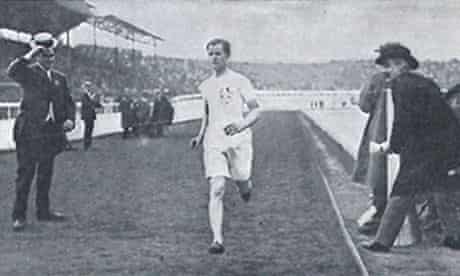
When London first staged the Olympic Games in summer 1908, one of the British heroes was Emil Voigt, a runner from Manchester who entered the five mile race at the last minute and set an Olympic record that still stands.
Voigt was a stalwart of Harriers race meetings in Manchester, occasionally cropping up in Manchester Guardian reports. It was during this period that he also worked as a Guardian correspondent, though, as was the style at the time, his pieces weren't bylined.
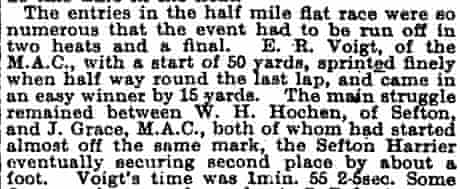
In July 1908 Voigt, an unknown outside the Lancashire running scene, won his five-mile heat in what the Guardian dubbed the 'race of the day'. Four days later he triumphed in the final, finishing over a minute faster than his time in the heats.
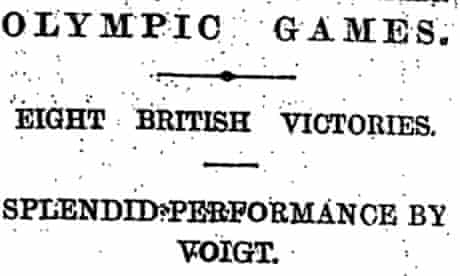
On his return from London he was presented with a 'gold watch, an address and a lifetime member's ticket' by Manchester Athletics Club.
Vegetarianism was central to Voigt's beliefs, but was a humanitarian choice rather than an athletic one. He was a member of the Vegetarian Cycling Club, who honoured him at a dinner in January 1909. At the banquet, Voigt spoke of his desire to eat simply and healthily, and suggested that others could achieve the same results if they avoided 'other harmful things, such as tea, coffee, and lentils.'
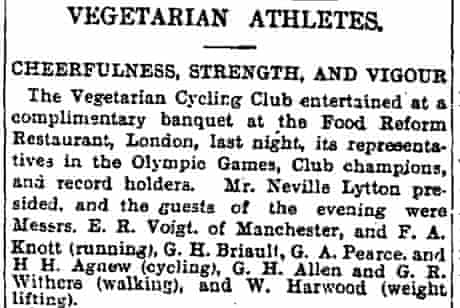
In 1910, Voigt founded the Amateur Athletics Union, aiming to improve the status of amateur athletes and the conditions they faced, but it was disbanded following Voigt's passage to Australia the following year.
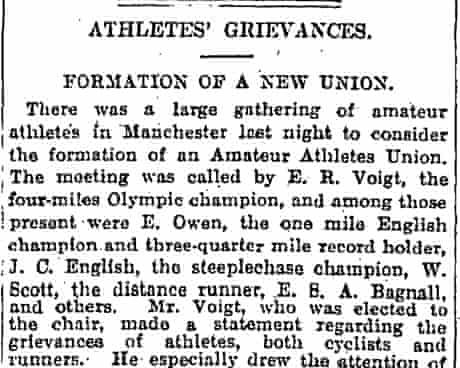
Though he returned to England at the outbreak of the first world war, Voigt eventually settled in Australia, where he became a pioneer in the field of radio broadcasting.
At this point he disappears from the pages of the Manchester Guardian, other than one curious footnote. In 1935, the newspaper reported that Voigt was safe in Russia; it was feared that he had been captured by the Germans during a visit to Europe. The article gives no explanation as to why Voigt, who was part-German, would have been detained.
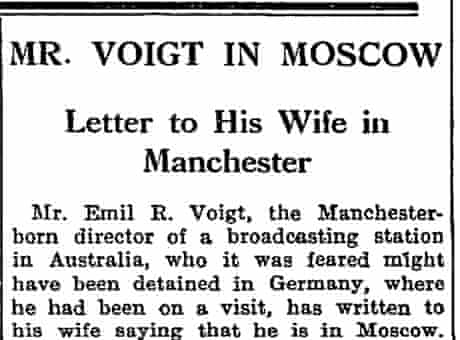
A year later, Voigt returned again to England, before retiring to New Zealand in 1947. His death in 1973 made the sports pages, but the paper made no mention of his brief stint as a Manchester Guardian man.
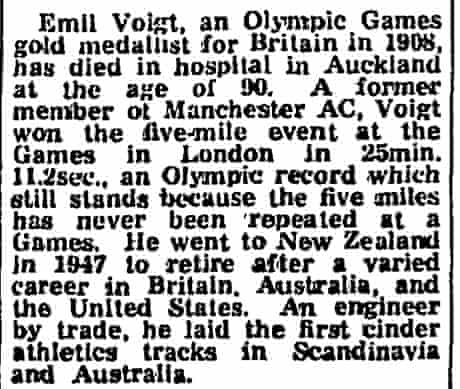





No comments:
Post a Comment